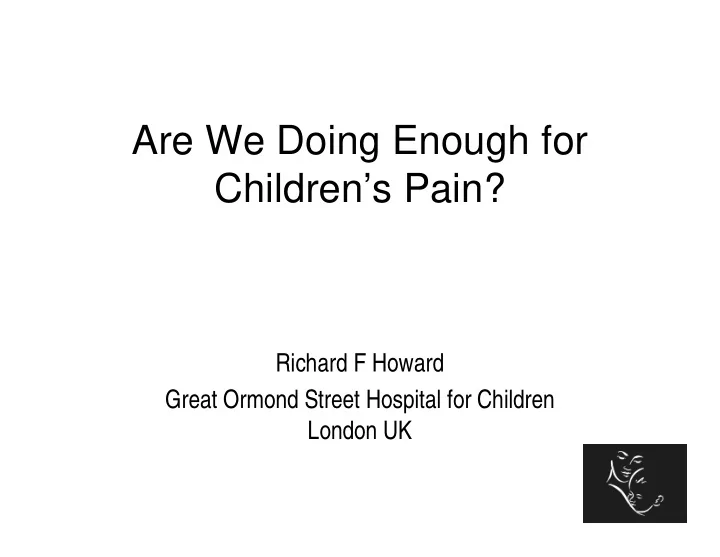

Are We Doing Enough for Children’s Pain? Richard F Howard Great Ormond Street Hospital for Children London UK
• Acute pain • Chronic pain • Pain in the neonate
Historical context - acute pain • Eland JM and Anderson JE 1977 • Schechter NL et al 1986 • Asprey JR 1994 • Ellis et al 2002 • CHI / Healthcare Commission 2004
Postoperative pain after day case surgery 30% ‘unbearable pain’ in first 24hrs • Romsing 1996 • Hamers 2002: 67% remember severe pain in hospital • Adenoidectomy: 20% moderate to severe pain • Kokki 1997 • Tonsillectomy: 35-75% severe pain • Warnock 1998, Swallow 2003 • Orchidopexy: 30% moderate to severe • Ho 2000
Acute pain Problem: • available treatments are not being used • new treatments (slow to become) or not available
Chronic pain • Goodman JE, McGrath PJ 1991 • Perquin CW et al 2000 • Schanberg LE et al 2003 • Weydert JA et al 2003
Chronic pain at GOSH 1998-2003 35% 30% 25% 20% 15% 10% 5% 0% Neuropathic E.B. Misc CPS CRPS
Chronic pain • Very little information about the efficacy of treatments for chronic pain in children • Medicines for the treatment of neuropathic pain all unlicenced for paediatric use
Pain in the neonate
Understanding analgesic effects in the neonate • Pharmacokinetics • Pharmacodyamic changes during development – receptor distribution – functional sensitivity – Non analgesic effects • Additional – individual variability in analgesic response – genetic variability
Pain in the neonate -history • Unable to feel pain due to x underdevelopment of CNS at birth • Found to produce substantial pain- related stress response • Increased research interest
the mechanisms of pain are different in infancy Nociception Persistent pain
Summary of changes in pain processing during postnatal development • Nociceptor and sensory neuron function • Descending modulation • Receptor distribution and function • Peripheral and spinal mechanisms of persistent pain
Long term effects of pain in infancy ? Normal development is activity dependent • Effect of neonatal circumcision on pain response during subsequent routine vaccination. Taddio et al Lancet. 1997; 349: 599-603. • Major surgery within the first three months of life.. Peters et al Pediatrics 2003; 111:129-135
Pain in the neonate • Neurobiology is age dependant • Few human studies of efficacy • Important concerns about side effects, toxicity and long term consequences of therapy
Medicines for children Children, young people, their parents or carers, and health care professionals in all settings make decisions about medicines based on sound information about risk and benefit. They have access to safe and effective medicines that are prescribed on the basis of the best available evidence. Standard. NSF for Children 2004, DH. UK. Available at www.dh.gov.uk
Current Best Evidence in Paediatric Acute Pain? NH&MRC Acute Pain Management Guideline •Level I & II – adult 67% – paediatric 8% •Level III & IV – adult 33% – paediatric 92%
Clinical questions Difficulties in paediatric clinical research studies subjective nature of pain • lack of acceptable outcome standards • - inability to self report - weaknesses of pain assessment ethical considerations: placebo, consent, • recruitment, design problems
Efficacy of Paracetamol (Acetaminophen) in Paediatric Studies Difficult to combine studies as variability in: – age range – dose – assessment – outcome – comparison / “control” group
Pain in children What should we be doing to improve pain management in children?
Evidence Based Paediatric Pain Management • laboratory investigation of mechanisms and developmental changes • better designed clinical trials – consideration of developmental age, mechanism – standardized outcomes; objective assessments – child friendly and appropriate formulations • ongoing evaluation of evidence • education and training • accelerate transition → → science trials clinical practice
Recommend
More recommend